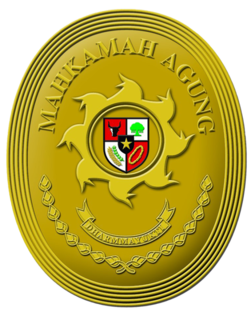
The politics of Indonesia take place in the framework of a presidential representative democratic republic whereby the President of Indonesia is both head of state and head of government and of a multi-party system. Executive power is exercised by the government. Legislative power is vested in both the government and the bicameral People's Consultative Assembly. The judiciary is independent of the executive and the legislature.

Suharto resigned as president of Indonesia on 21 May 1998 following the collapse of support for his three-decade-long presidency. The resignation followed severe economic and political crises over the previous six to twelve months. Vice president B. J. Habibie took over the presidency.

The Supreme People's Court of the People's Republic of China is the highest court of the People's Republic of China. It exercises appellate jurisdiction over cases that originated from the high people's courts and original jurisdiction over cases concerning matters of national importance. The court also has a quasi-legislative power to issue judicial interpretations and adjudication rules on court procedure.

William Henry Hastie Jr. was an American lawyer, judge, educator, public official, and civil rights advocate. He was the first African American to serve as Governor of the United States Virgin Islands, as a federal judge, and as a federal appellate judge. He served as a United States Circuit Judge of the United States Court of Appeals for the Third Circuit and previously served as District Judge of the District Court of the Virgin Islands.

The Supreme Court of the Republic of Indonesia is the independent judicial arm of the state. It maintains a system of courts and sits above the other courts and is the final court of appeal. It can also re-examine cases if new evidence emerges.

Sjafruddin Prawiranegara,, was an Indonesian politician, economist, and latterly Islamic philosopher. An early member of the KNIP, he briefly served as the head of government during the Indonesian Revolution when fellow revolutionaries Sukarno and Hatta were captured.

The Judicial Commission of Indonesia was established as a consequence of the third amendment to the Constitution of Indonesia ratified by the Indonesian People's Consultative Assembly on 9 November 2001. The Commission's duty is to monitor the performance of judges, advise the House of Representatives on judicial appointments and review community complaints about the behavior and fairness of presiding judges.

Patrialis Akbar is an advocate and politician who was member of the Constitutional Court Justice of the Indonesian Constitutional Court for the period 2013-2017 from Padang, West Sumatra. He has a complete career in three branches of state, legislative, executive and judicial power. He had served as a member of the House of Representatives for two periods.
Wirjono Prodjodikoro was the head justice of the Indonesian Supreme Court from 1952 to 1966.

Dr. Sahardjo LL.B., was a National Hero and Minister of Justice of Indonesia during the First, Second, and Third Working Cabinets.

Marzuki Darusman is an Indonesian lawyer and human rights campaigner. After fifteen years as a member of the People's Representative Council with President Suharto's Golkar party, he served the country's prosecutor general from 1999 to 2001. Darusman has served on several national and international human rights commissions, and in August 2010, he became founding director of the Human Rights Resource Centre for ASEAN.

Adnan Buyung Nasution, also known as Adnan Bahrum Nasution was an Indonesian lawyer, advocate, and activist.
Suryadi was a former Chief Justice of the Supreme Court of Indonesia, as well as the first chairman of the Indonesian Judges Association.
Subekti (1914-1992) was the fourth Chief Justice of the Supreme Court of Indonesia.

Umar Seno Aji (1915–1984) was the fifth Chief Justice of the Supreme Court of Indonesia as well as the fourteenth Indonesian Minister of Law and Human Rights.
Mujono (1927-1984) was the sixth Chief Justice of the Supreme Court of Indonesia as well as the 16th Minister of Law and Human Rights. His appointment to both posts began a line of former military officials predominating in Indonesia's legal system.
The Indonesian Judges Association, known locally as Ikatan Hakim Indonesia or IKAHI is an association of judicial officials in Indonesia. IKAHI's members include first-level trial judges and senior justices, as opposed to the Indonesian Judges' Forum (FDHI) which includes appeals court judges. IKAHI executive Suhadi has described the association's focus as protection of judges from threats and harassment, though judicial transparency activists have disputed this.

Purwoto Gandasubrata was the eighth Chief Justice of the Supreme Court of Indonesia. Alongside the Ministry of Justice officials in the Sixth Development Cabinet, Gandasubrata was a part of a general return of civilian officials to the judiciary of Indonesia in the early 1990s after a period of former military officials dominating the branch from the late 1970s. Gandasubrata had initially served as the chief of the district court of Semarang, as well as the chairman of the regional branch of the Indonesian Judges Association.
Sarwata bin Kertotenoyo was the tenth Chief Justice of the Supreme Court of Indonesia. Bin Kertotenoyo led an investigation by the Supreme Court into allegations of its own wrongdoing in 1996, during which his panel found no evidence of such wrongdoing. His promotion as Chief Justice thereafter was seen as a victory for the Court's old elite. He was the first Chief Justice of Indonesia to be openly accused of corruption.
The Legal Aid Institute Jakarta, also known as Lembaga Bantuan Hukum Jakarta, is Indonesia's first legal aid non-government organization. LBH Jakarta seeks to provide legal aid for the poor, aiding with law illiteracy, and suppressed peoples. LBH was established in 1969 in the city of Jakarta as the first LBH of what would eventually become multiple LBH offices around the country. It was not until 1970, with the support of PERADIN and the Provincial government of Jakarta, that LBH officially began commencing in operations. After the establishment of the YLBHI, which also operates out of Jakarta, the LBH located in Jakarta became the legal aid institute for the city.












